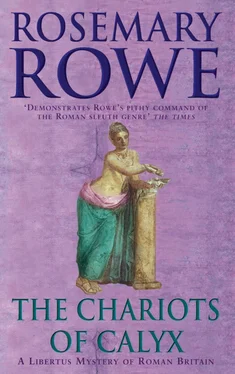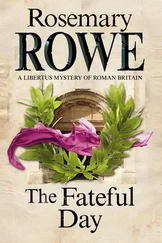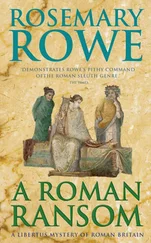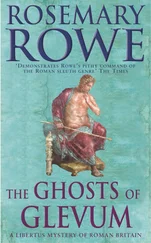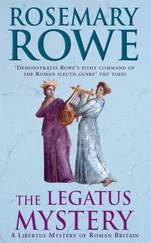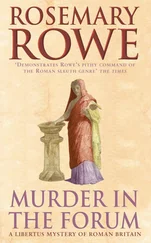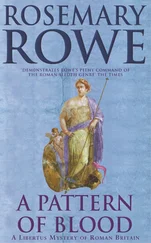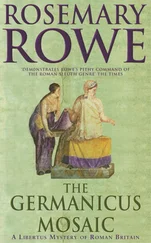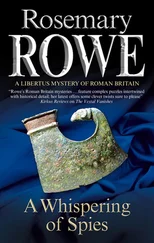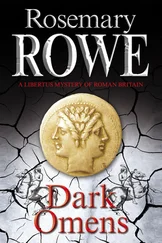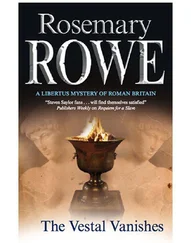Rosemary Rowe - The Chariots of Calyx
Здесь есть возможность читать онлайн «Rosemary Rowe - The Chariots of Calyx» весь текст электронной книги совершенно бесплатно (целиком полную версию без сокращений). В некоторых случаях можно слушать аудио, скачать через торрент в формате fb2 и присутствует краткое содержание. Год выпуска: 2002, ISBN: 2002, Издательство: Headline, Жанр: Исторический детектив, на английском языке. Описание произведения, (предисловие) а так же отзывы посетителей доступны на портале библиотеки ЛибКат.
- Название:The Chariots of Calyx
- Автор:
- Издательство:Headline
- Жанр:
- Год:2002
- ISBN:9781472205087
- Рейтинг книги:5 / 5. Голосов: 1
-
Избранное:Добавить в избранное
- Отзывы:
-
Ваша оценка:
- 100
- 1
- 2
- 3
- 4
- 5
The Chariots of Calyx: краткое содержание, описание и аннотация
Предлагаем к чтению аннотацию, описание, краткое содержание или предисловие (зависит от того, что написал сам автор книги «The Chariots of Calyx»). Если вы не нашли необходимую информацию о книге — напишите в комментариях, мы постараемся отыскать её.
The Chariots of Calyx — читать онлайн бесплатно полную книгу (весь текст) целиком
Ниже представлен текст книги, разбитый по страницам. Система сохранения места последней прочитанной страницы, позволяет с удобством читать онлайн бесплатно книгу «The Chariots of Calyx», без необходимости каждый раз заново искать на чём Вы остановились. Поставьте закладку, и сможете в любой момент перейти на страницу, на которой закончили чтение.
Интервал:
Закладка:
Chapter Eleven
The next morning we were woken by a soldier, a double-pay officer in full uniform, who brought us a breakfast of hard wheaten biscuits and thin wine.
‘Standard army rations,’ he told me, with a smile, ‘though the commander has sent you some fruit in too, seeing that you come from the governor. Oh, and I am to give you his apologies, citizen. He didn’t want to rouse you early, but I think you said you wanted to attend the chariot racing? It is already an hour after dawn, and if you and your servant want to be sure of a seat…?’
We did. Junio was on his feet almost before the optio had finished speaking, and was already splashing cold water enthusiastically from the jug beside the door into a large bowl which he had found on the stone bench. Very cold water, I suspected, since the promised brazier had never arrived, and I eyed these preparations rather reluctantly from the comfortable warmth of my bed, while the optio bowed himself out with promises to return as soon as I was ready to leave. He would personally escort us to the stadium — on the commander’s express instructions.
I was dressed only in my tunic, but I rose and stood shivering on the stone floor while Junio rinsed my hands and face. Then I gnawed my way through some breakfast and allowed myself to be dressed once more in my toga, though Junio was so excited by the prospect of the day ahead that he had to make two attempts at draping the cloth. He was so eager and anxious to be gone that I took pity on him in the end and fastened my own sandals, while he crammed food into his mouth. When I looked up he was standing ready at the door, before he had really finished swallowing. Army biscuits are said to breed hard men — certainly they exercise the jaws.
I clapped Junio on the shoulder and we set off together.
The optio , true to his word, was waiting outside the door, and as soon as we made an appearance he took up a place beside me, gesturing for two other members of his company to bring up front and rear. Junio had naturally stepped deferentially behind me, so I found myself forming the central part of a little procession as we walked out of the barracks. The guards at the gate of the fort moved smartly to let us through, and in the streets outside, the townsfolk stood even more hastily aside, abandoning their business to whisper and goggle at us as we went by.
I am not used to being stared at, and I found myself falling into step with the soldiers and marching along rather importantly, the townsfolk in the busy streets parting before us like cheese under a cook’s cleaver.
‘Wonder what he’s done, poor fellow,’ I heard a trader mutter, as he and his laden donkey tried to squeeze themselves into a doorway to let us pass. I suppose I did look as if I were under some kind of military arrest. I walked the rest of the way to the stadium in a more chastened frame of mind, and my feet deliberately out of time with those of my marching escort.
The stadium had been set up just outside the town walls, at the foot of a small hillock, and was obviously large. A high wicker fence surrounded the enclosure, with an impressive entrance gate at one end through which the public were currently pouring.
As we made our way to the head of the jostling mob, I noticed a large and heavily built guard using a cudgel on an unfortunate youth in an ochre tunic who was trying to scale the fence, although entry to the stadium was free. I grimaced in sympathy, but the boy had been taking an obvious risk. The organisers of race meets always take a dim view of visitors who attempt to get in without running the gauntlet of fast-food sellers, wine and water vendors, souvenir stalls, soothsayers and official betting booths which have been granted expensive licences to operate inside the fence.
If the people in the streets had not known who we were, here we were certainly expected. The same cudgel-bearing guard appeared, and wielded his weapon — rather indiscriminately I thought — to open a path for us among the throng. People do not argue with a cudgel, and we were soon inside.
My patron, Marcus, would doubtless have thought it nothing, after the Circus Maximus in Rome, but compared to the races I had seen in Glevum this was a revelation. The stadium was huge. The slope of the hill itself formed a natural grandstand on one side of the track; a wooden framework had been erected on the other side, with tiered benches on top of it, while at the further end, behind the turning post, was a covered viewing box for town officials and any visiting dignitaries.
The track was impressive, too. There was a purpose-built central reservation, with a wide track around it — sand laid on hammered clay, by the look of it — and a dozen slaves were already raking the surface flat. Proper hurdle fences separated the spectators from the action and there were portable wicker starting-stalls provided for the horses. A pair of wide wooden gates under the civic box led from the stadium into the stables and changing yard beyond. At the turning point, six rocking dolphins, made of gilded wood, were permanently displayed on poles, ready for the circuit-slaves to tip them forward one at a time, as the horses passed, and so help the crowd keep count of the laps.
The optio was right about obtaining a seat. Already the far bank was packed with spectators, many of them waving red, white or blue scarves in anticipation. I was surprised how few Green supporters there appeared to be. In Glevum there are always hundreds of them, not least because the Green faction is notoriously ‘for the people’ and against the governing classes, and supporting them is one of the few ways in which ordinary citizens can safely demonstrate their lack of sympathy with the Emperor.
(In fact, as I discovered later, support for the Greens was very strong in Verulamium. The absence of scarves was on my account — rumour of my imperial warrant had spread, and upon my arrival at the racecourse all the Green colours had been hastily hidden. Even in this outpost of Empire, it is sometimes dangerous to be seen cheering for the wrong people.)
Perhaps because of the presence of my escort, finding ourselves somewhere to sit was not a problem. Spectators melted away at our approach, and we were able to commandeer an excellent vantage point on the hill, near the turning point. We had hardly settled ourselves there before a slave arrived to invite us to join the civic dignitaries in the box over the stands, but I (very politely) declined on the grounds that I was acting on the governor’s instructions and wished to have a closer view of the horses. I did not want to be part of the civic party — people in the official box become almost as much of a spectacle as the chariots themselves and I wanted to observe Fortunatus without half the town knowing I was doing so.
I know from experience that the best view is always obtained from a point just before the apex of the corner, where one can see the horses turning at the other end and the whole of the straight — where the speed is greatest — and obtain a wonderful view of the entry to the bend, where the skill of the horsemen is most in evidence, and — as Junio could tell you — most of the spectacular crashes occur.
Pertinax’s bounty as we left permitted me the unaccustomed luxury of buying a handful of ‘hot nuts and crispy pork pieces’ from one of the itinerant vendors who moved among the crowd. They were not very warm and not remotely crispy, but as we sat back upon the bank and joined the rippling anticipation of the crowd I began to share something of Junio’s excitement. I handed him the little container made of twisted bark, and he helped himself to a piece of greasy pork with a sigh of pure happiness. The soldiers were all three staring into the distance with an expression of loftiest disdain, so I did not offer them any. I gave Junio a few coins to stake on one of the teams, and he set off to find someone to bet with, while I huddled the rest of my purchase to myself and settled back to wait for the spectacle.
Читать дальшеИнтервал:
Закладка:
Похожие книги на «The Chariots of Calyx»
Представляем Вашему вниманию похожие книги на «The Chariots of Calyx» списком для выбора. Мы отобрали схожую по названию и смыслу литературу в надежде предоставить читателям больше вариантов отыскать новые, интересные, ещё непрочитанные произведения.
Обсуждение, отзывы о книге «The Chariots of Calyx» и просто собственные мнения читателей. Оставьте ваши комментарии, напишите, что Вы думаете о произведении, его смысле или главных героях. Укажите что конкретно понравилось, а что нет, и почему Вы так считаете.
